local report
If Streets Around the World
Unite Hand in Hand
It Will Turn Into a Tremendous Power

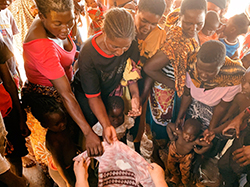
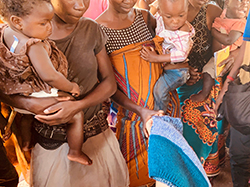
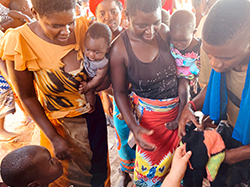
Mvunguti, Malawi... Distributing sweaters from the "Sending Warm Sweaters to Children of the World"
We received a donation of 100 hand-knitted sweaters from the "Sending Warm Sweaters to Children of the World." This warm support was delivered to the designated area called Mvunguti, Malawi.
Mvunguti is located 40-minute boat ride from the small town of Monkey Bay. To get there, you need to walk on a rocky ground, which was very dangerous and difficult for us, and even the locals could not get to town on foot except for strong men. The village is very poor and due to its location, there is no electricity, gas, mobile network and clean water. The lake has a sandy shore but it's very narrow and people live on a rocky slope. The few shores are used by the village's fishermen as a place to dry fish.
私We first visited this village in 2007. This was the first time a foreign NGO had entered this village.
We tested the villagers for HIV/AIDS and distributed transport coupons to the town to those who tested positive. The village has a very high rate of AIDS infection, with 43% testing positive for the disease in 2007. In those days, the majority of the villagers had been tested and found to be positive, but they didn't have the money for transport to the hospital, so they didn't bother to get tested. To get to Monkey Bay, where the hospital is located, using a boat would cost MWK700 (about $1) for a round trip. If you go to the hospital, you can get a month's worth of medicine for free. But many people were dying in this village because they couldn't pay that $1.
But after we distributed transport coupons to those tested positive and people who were bedridden at stage 3 went to the hospital, started taking their medication, became healthy and able to work, more people began to get tested in 2008. The consciousness of the villagers started to change.
The rate of AIDS infection has decreased, but is still high. However, the fact that everyone is now living positively and paying more attention to hygiene is a great hope.
As I mentioned earlier, this village is located on a rocky slope, which is the reason why we donated sweaters to this village. During the dry season, the heat exceeds 30 degrees Celsius during the daytime, but in the evening, the temperature drops rapidly with strong winds. There are no hospitals or clinics in this village, so the probability of death is very high if you get sick. Since this is the poorest area of the country, there is no way they can buy sweaters for their children. That's why we chose this village. We thought we could make the best use of the sweaters we were given.
When the sweater distribution started, a lot of young mothers came and made a lot of noise. In the end, the sweaters we received weren't enough in number. The mothers who received their sweaters looked really happy, but the ones who didn't looked very disappointed and we felt sad. Basically, priority were the poor families, HIV/AIDS positive mothers and mothers whose children were sick.
We didn't get to take all the pictures because it was such a chaos. We originally wanted to take pictures of the babies wearing sweaters, but it was impossible to put them on in the daytime where it was over 30 degrees Celsius, so we only took the pictures of us handing them out.The village chief and volunteers were very pleased with the results. Thank you so much to the "Sending Warm Sweaters to Children of the World" group!

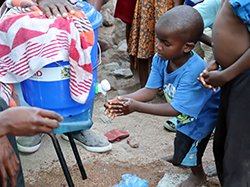
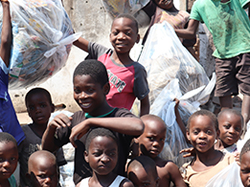
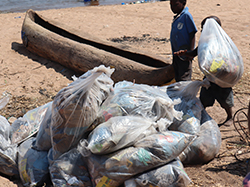
Zero Waste Project in Msaka and Mvunguti
The Zero Trash Project began our last visit in 2018. We picked up garbage with children under the slogan "No Fish No Life."
There has been a significant increase in plastic waste in Malawi over the past few years. This is true even in the poorest areas. Our support site is a village on the shores of Lake Malawi, home to many fishermen. During the rainy season, plastic waste is washed into the lake. Like ocean pollution, lake fish are at risk. There is no doubt that the fish in the lake will eventually die. If that happens, the fishermen will not be able to make ends meet. And every year during the rainy season in this region, malaria, cholera, dysentery, tuberculosis and other outbreaks take people's lives. When plastic waste is scattered around, it causes water to accumulate, which leads to poor hygiene and the spread of these diseases.
The problem is that no one has the information that fish are dying and plastic waste is causing sanitation problems. This kind of information is hard to come by in a place where there is no electricity, gas, water, or mobile phone network. So even adults don't know this fact.
The idea behind our project is that we are "helping." Eventually, we plan to provide support that can continue with the villagers alone.
That's why we came up with the idea of conducting a zero-waste project with children. If you talk to adults who are pursuing financial gain out of the blue, they often won't listen to you. So we gathered the children and showed pictures of fish in Japan that are eating plastic waste and dying. The children listen intently. The children nodded as we led the class with the slogan "No Fish No Life," and when the class was over, they all went to the littered area to collect the waste. The volunteers took large garbage bags to them and they got filled with waste in the blink of an eye. The adults who were watched became embarrassed and started to help.
The key to succeeding this project in the village that is extremely poor and does not have the financial means to collect garbage: the children's help.
After the children finish cleaning the garbage, they line up and wash their hands. It is also important to teach them to wash their hands before they eat. You don't know what kind of germs are hiding.
Then, when they are done washing their hands, they will be rewarded with a biscuit. A biscuit is the cheapest thing in Malawi, but even that is a treat for the children. The skinny children in tattered clothes pick up trash, wash their hands, get a biscuit, and then go back to pick up the garbage. And then they get a big smile on their faces when they finally get more biscuits than they can hold.
I think this approach would clean up the village for a small amount of money, make the children happy, and change the mindset of the adults.
However, it is the adults who are actually dumping the garbage. Especially in the village of Msaka, fishermen from other villages have been visiting in recent years for the convenience of distribution and they are causing various problems. The garbage problem is one of them. Village chief and volunteers are also scratching their heads. The next time we visit, I want to think more about this issue with the whole village and come up with ideas to improve. I guess we will need to have a class and teach district representatives and fishermen's representatives...
Past Reports
※ Reproducing all or any part of the contents of this site is prohibited without author's permission.
